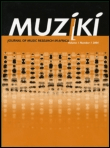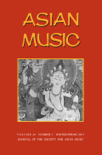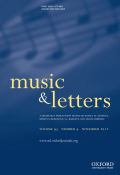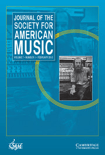
Muziki-Journal of Music Research in Africa
Scope & Guideline
Exploring the Rhythms of Africa's Musical Heritage
Introduction
Aims and Scopes
- Cultural Preservation and Documentation:
The journal showcases research focused on the preservation and significance of traditional music forms, highlighting the need to document and sustain these cultural heritages. - Contemporary Music Practices:
A significant focus is placed on the analysis of modern music trends, including popular music and its socio-political implications, reflecting the dynamic nature of music in contemporary African societies. - Gender and Music:
The exploration of gender representations in music is a core area, examining how cultural politics and social values influence musical expression and performance. - Music Education and Pedagogy:
Research on music education, including innovative teaching methods and the challenges faced by music students, is a prominent theme, emphasizing the importance of music as a tool for learning and personal development. - Interdisciplinary Approaches:
The journal encourages interdisciplinary methodologies, integrating perspectives from sociology, psychology, and cultural studies to enrich the understanding of music within African contexts.
Trending and Emerging
- Social Media and Music Representation:
There is a growing interest in how social media shapes the portrayal of musicians and music cultures, particularly concerning gender and identity politics, indicating the influence of digital platforms on music dissemination. - Music and Activism:
Research focusing on music as a tool for activism and social change has gained prominence, reflecting the role of music in addressing socio-political issues and mobilizing communities. - Mental Health and Music Education:
An emerging theme is the intersection of mental health and music education, exploring the psychological aspects of music learning and performance, which is becoming increasingly relevant in educational discussions. - Hybrid Musical Forms and Globalization:
The exploration of hybrid musical styles that emerge from globalization and cultural exchange is on the rise, showcasing the complex interactions between traditional and contemporary music. - Technology in Music Learning and Performance:
There is an increasing trend in research that examines the role of technology in music education and performance practices, reflecting the evolving landscape of music in the digital age.
Declining or Waning
- Traditional Music and Ritual Practices:
While traditional music remains important, the specific focus on ritualistic and ceremonial aspects appears to have diminished, with fewer studies emphasizing these contexts in recent years. - Historical Music Analysis:
Research centered on historical perspectives of music practices, such as extensive historical narratives or archival studies, seems to be less prevalent, indicating a shift towards more contemporary analyses. - Regional Studies in Isolation:
There is a noticeable decline in studies that focus solely on specific regional music practices without integrating broader continental or global perspectives, reflecting a trend towards more holistic approaches.
Similar Journals

Problemy Muzykalnoi Nauki-Music Scholarship
Fostering Insight into Music's Socio-Cultural ImpactWelcome to Problemy Muzykalnoi Nauki-Music Scholarship, a leading journal in the field of music scholarship published by the esteemed Gnesin Russian Academy of Music. With an ISSN of 2782-358X and an E-ISSN of 2782-3598, this Open Access journal has been committed to the dissemination of high-quality research since 2009, making scholarly work accessible to a global audience. Covering diverse aspects of music theory, history, and its socio-cultural impacts, Problemy Muzykalnoi Nauki serves as an essential platform for scholars, educators, and practitioners in the arts and humanities, as well as in social sciences related to music education. While its Scopus coverage was discontinued in 2021, the journal remains influential, holding a rank of #48 in the Arts and Humanities category and a percentile of 67th, showcasing its relevance and rigor in the discipline. We invite researchers and students alike to explore the rich contributions made within these pages, fostering a deeper understanding and appreciation of music in contemporary society.

Oido Pensante
Unlocking the Cultural Dimensions of MusicOido Pensante is a prominent open-access journal dedicated to the multifaceted field of music, published by the esteemed University of Buenos Aires, specifically through its Faculty of Philosophy and Letters, Institute of Anthropological Sciences. Since its inception in 2013, this journal has fostered a rich platform for scholarly discourse and innovative research at the intersection of music and cultural studies. With an ISSN of 2250-7116, Oido Pensante aims to bridge theoretical frameworks and practical applications, making significant contributions to the understanding of music in its social context. Currently, it holds an impressive Q3 ranking in the Arts and Humanities – Music category for 2023, with a Scopus rank of #99 out of 180 journals, reflecting its commitment to academic rigor and relevance. The journal's open access policy ensures that research is widely disseminated and accessible, making it an invaluable resource for researchers, professionals, and students alike in Argentina and beyond. With converged years from 2017 to 2024, Oido Pensante continues to expand its reach, encouraging intellectual exchange and stimulating dialogue within the music community.

Studia Universitatis Babes-Bolyai Musica
Fostering Scholarly Dialogue in MusicologyStudia Universitatis Babes-Bolyai Musica is a prestigious academic journal dedicated to the field of musicology, published by UNIV BABES-BOLYAI. Since its inception, it has strived to foster scholarly communication and share groundbreaking research that spans various music-related disciplines, including ethnomusicology, music theory, and performance studies. The journal operates under an Open Access model since 2021, ensuring that its content is freely accessible to a global audience of researchers, professionals, and students interested in advancing their knowledge and understanding of music. By providing a platform for high-quality, peer-reviewed articles, Studia Universitatis Babes-Bolyai Musica plays a vital role in promoting significant contributions to the evolving discourse in music studies. Its commitment to intellectual rigor and openness aligns with contemporary academic trends, making it an essential resource in the realm of music research.

MUSICAL TIMES
Cultivating Scholarly Excellence in MusicologyMUSICAL TIMES is a distinguished journal dedicated to the exploration and dissemination of scholarly works in the realm of music, serving as an essential resource for researchers, professionals, and students alike. Published by MUSICAL TIMES PUBLICATIONS LTD, this journal has built a robust reputation within the arts and humanities, specifically focusing on music studies, with an impactful reach indicated by its Scopus ranking at #73 out of 106 in the field. Though access to this journal is not open, its curated content, which spans various facets of musicology and contemporary music discourse, enriches the academic community by encouraging insightful discussions and critical analyses. With its historical roots tracing back to its inception, MUSICAL TIMES aims to foster a deeper understanding of music's cultural, social, and artistic dimensions, making it a valued publication for those engaged in the scholarly pursuit of music.

REVUE DE MUSICOLOGIE
Unveiling the Cultural Tapestry of SoundREVUE DE MUSICOLOGIE is a prominent academic journal dedicated to the diverse field of musicology, published by EDITIONS TRANSATLANTIQUES in France. With an ISSN of 0035-1601, this journal has been a key platform for researchers and scholars since its inception, fostering scholarly discourse and advancing the understanding of music's cultural, theoretical, and historical dimensions. Although it currently holds a Q4 category in Music according to the 2023 quartiles and is ranked #140 in the Scopus Arts and Humanities Music category, REVUE DE MUSICOLOGIE continues to publish valuable insights that contribute to the global musicological landscape. The journal does not offer open access, adhering to standard subscription models. Its primary objective is to provide a rigorous forum for original research articles, reviews, and theoretical discussions, making it an essential resource for academics, professionals, and students in the field of musicology. Located at 50 RUE JOSEPH DE MAISTRE, 75018 PARIS, FRANCE, it promises to remain a vital part of music research through 2023 and beyond.

ASIAN MUSIC
Unveiling the Harmonies of Culture and Sound.ASIAN MUSIC is a distinguished academic journal published by University of Texas Press, focusing on the rich and diverse musical traditions of Asia. With an ISSN of 0044-9202 and an E-ISSN of 1553-5630, this journal serves as a key platform for interdisciplinary research that encompasses musicology, ethnomusicology, and cultural studies related to Asian music practices. While ASIAN MUSIC is not an open-access journal, it provides valuable insights and scholarly articles that contribute significantly to the understanding of music’s role within Asian cultures. The journal originally covered works from 2002 to 2010 and has a reputation for fostering discussions that celebrate the intricacies of sound, performance, and society. Targeting researchers, professionals, and students alike, ASIAN MUSIC stands as a crucial resource for those engaged in the study of music in its multifaceted context.

MUSIC & LETTERS
Advancing the Dialogue Between Notes and WordsMUSIC & LETTERS, published by Oxford University Press, is a prominent academic journal that has been at the forefront of musicology and music studies since its inception in 1920. With an ISSN of 0027-4224 and an E-ISSN of 1477-4631, the journal provides a platform for scholarly articles that explore the rich interplay between music and literature, contributing significantly to the understanding of musical context, form, and societal impact. As of 2023, it holds a respectable Q3 rank in Music within its category, positioned at Rank #66 out of 180 in the Scopus Arts and Humanities Music category. Despite not being an Open Access journal, its rigorous peer-review process and commitment to high-quality research make it an essential resource for researchers, professionals, and students alike. The journal's scope encompasses various genres and historical periods, ensuring a comprehensive examination of music's role in culture and community, thereby enhancing the scholarly discourse within this vibrant field. Based in the United Kingdom, at Great Clarendon St, Oxford OX2 6DP, England, MUSIC & LETTERS continues to inspire and inform the global music scholarly community.

Journal of the Society for American Music
Fostering Dialogue in the World of American Music StudiesThe Journal of the Society for American Music is a leading academic journal dedicated to the study of American music and its diverse cultural contexts. Published by Cambridge University Press, this journal serves as a vital platform for researchers and professionals in the fields of musicology, ethnomusicology, and American studies, contributing significantly to scholarly discourse and advancing knowledge in these areas. With an impressive impact factor reflecting its academic rigor, it is placed in Q2 of the music category as of 2023 and ranks #55 out of 180 in the Arts and Humanities segment, placing it in the 69th percentile among its peers. Since its inception, the journal has published a wealth of articles, reviews, and critical studies that explore the rich tapestry of American musical traditions from historical and contemporary perspectives. It operates under a subscription model, ensuring a wide distribution and accessibility to its important findings. Researchers, students, and professionals alike will find the journal an essential resource for advancing their understanding of the dynamic landscape of American music.

Malaysian Journal of Music
Unveiling the Melodies of Tradition and InnovationThe Malaysian Journal of Music is a distinguished academic publication dedicated to the exploration and advancement of music and cultural studies within the Southeast Asian context. Published by UNIV PENDIDIKAN SULTAN IDRIS, FACULTY OF MUSIC & PERFORMING ARTS, this journal contributes significantly to the field by disseminating high-quality research and scholarship related to both traditional and contemporary music practices in Malaysia and beyond. Since its inception in 2018, the journal has earned a Q3 categorization in both Cultural Studies and Music, reflecting its commitment to fostering a comprehensive understanding of these interdisciplinary areas. As of now, it ranks 90th out of 180 in the domain of Arts and Humanities focused on Music, positioning it firmly within the academic discourse. The Malaysian Journal of Music serves as an invaluable resource for researchers, professionals, and students alike, providing insights into the rich tapestry of music, culture, and their societal impacts. The journal is dedicated to open access publishing, ensuring that knowledge is shared widely and freely, further solidifying its role as a cornerstone for music scholarship in Malaysia.

RIVISTA ITALIANA DI MUSICOLOGIA
Exploring the Depths of Musical HeritageRIVISTA ITALIANA DI MUSICOLOGIA, published by the Italian Society of Musicology, is a distinguished journal dedicated to the field of musicology, offering a platform for scholarly research and discourse on a wide array of musical topics. With an ISSN of 0035-6867 and an E-ISSN of 2036-5586, this journal has contributed significantly to the understanding of music in cultural and historical contexts. Although the scope of coverage was marked from 2003 to 2008 in renowned databases like Scopus, the journal continues to serve as an invaluable resource for researchers, educators, and students embroiled in music studies. Its emphasis on rigorous research and critical analysis makes it a vital asset for anyone seeking to deepen their knowledge of musicological inquiry. While not an open-access publication, the RIVISTA ITALIANA DI MUSICOLOGIA remains a prestigious outlet for scholarly contributions that reach audiences eager to explore the complexities of musical heritage.